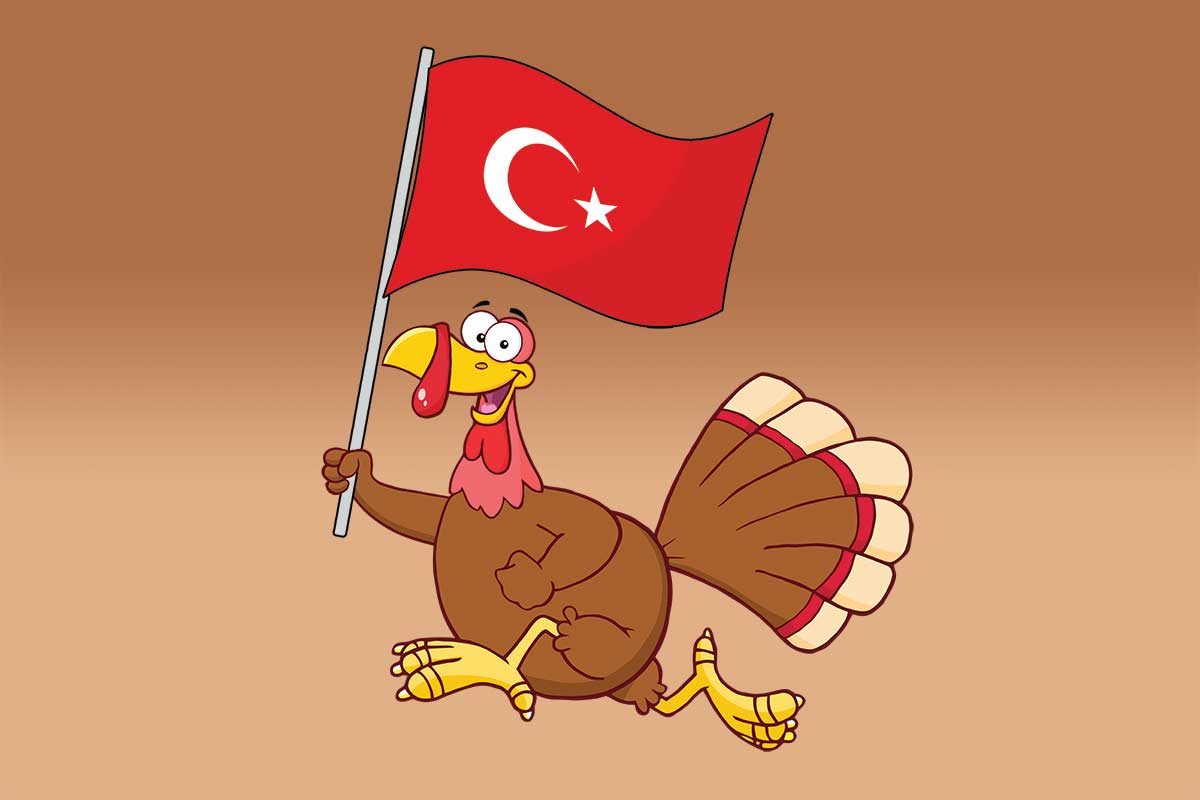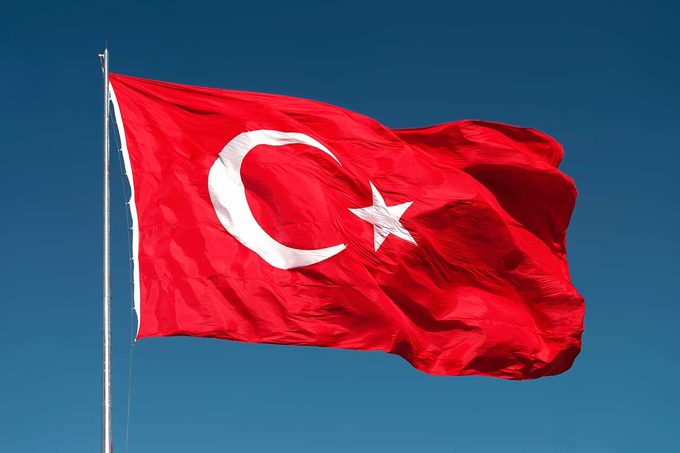The history of the term turkey tells a surprising story of mistaken identities and global trade. But is the star of Thanksgiving named after the country of Turkey? We asked a linguist.

Which Turkey Came First: the Bird or the Country?

Thanksgiving is almost here, and if you’re anything like us, you’re already thinking about turkey. The bird is a big deal—and that’s putting it mildly. It’s the centerpiece of the table for 88% of Americans, according to the National Turkey Federation. Heck, we even nicknamed the fourth Thursday in November “Turkey Day.”
But why is turkey at the center of the traditional feast? And is it named after Turkey the nation, or was the country named after the fowl? I talked to a language historian to find out.
Read on to learn which came first: the bird or the country. The surprising answer is a fun piece of Thanksgiving trivia to share with your guests. So let’s talk turkey!
Get Reader’s Digest’s Read Up newsletter for more holidays, humor, travel, tech and fun facts all week long.
Why is the country called Turkey?

The country’s name comes from its inhabitants, the Turks. According to the Oxford English Dictionary, the earliest known use of the noun Turkey to refer to the land occupied by the Turks occurred in the Middle English period (1150 to 1500). Chaucer’s mention of the region in the Canterbury Tales is one of the earliest recorded instances, according to Michael Adams, PhD, a professor of English and linguistics at Indiana University.
By 1425, texts like The Siege of Jerusalem solidified Turkey as a place name in English.
Why is the bird called a turkey?

Get ready for a shocker: The bird at the center of the traditional Thanksgiving feast isn’t called a turkey because it comes from Turkey. Instead, it got its name from a series of misinterpretations. “There are two mistakes involved in turkey, the name of the bird,” says Adams.
Incorrect association
First, there is an African bird that today is known as the guinea fowl. That bird was introduced to Europe by way of merchants who brought many goods, spices, textiles and animals through Ottoman-controlled trade networks. The poultry (along with other exotic items that came through Ottoman lands) came to be associated with Turkey—even though it wasn’t from Turkey.
“They called those guinea fowls turkey cocks and turkey hens in England in the 16th century before anybody came to North America,” says Adams.
Mistaken Identity
That led to the second error, according to Adams: a case of mistaken identity. When the English settlers encountered the American wild turkey, it resembled the guinea fowl they were used to eating, so they assumed it was one. In reality, the two birds are different species. The American turkey was indigenous to North and Central America, where it was a staple of Indigenous diets; the Aztecs had domesticated turkeys in what is now Mexico hundreds of years before the Europeans arrived.
“This is a very human problem,” says Adams. “You see something you’ve never seen before, but it looks like something you’ve seen before, so you use that name for it.”
And let’s be honest: The early settlers couldn’t take a picture and do a reverse-image search to see what kind of bird it was. So lo and behold, the English settlers started calling this bird a turkey hen or turkey cock—or just a turkey—as well. John Smith mentions the bird in The Generall Historie of Virginia, New-England, and the Summer Isles, which was first published in 1624.
Lasting effect
In time, the Native American bird made its way to Europe via the Spanish conquistadors and others who had visited the New World, and the name turkey stuck. Eventually, people came to realize that the American turkey and the guinea fowl (the bird that sparked the whole case of mistaken identity) were not, in fact, members of the same species.
So the turkey moniker was dropped from the guinea fowl, and those birds went back to being called guinea hens and cocks. In fact, per the Oxford English Dictionary, the meaning of the word turkey for “guinea fowl” is obsolete. “Americans have our turkey, and it’s the only turkey,” says Adams.
So which came first: turkey or Turkey?
“English registered the name Turkey for the geographical area first before they started to ascribe the name to any sort of animal,” says Adams. But that doesn’t mean the bird’s name is directly related to the country.
In the end, it doesn’t matter that the name of the Thanksgiving Day star is rooted in linguistic confusion. “We’re not going to change the name of what we call the American bird just because we know it’s the wrong name.” says Adams. “[Turkey ] is one of those words that reminds me that the words we use for things aren’t scientifically connected to the words we use for things.”
This intriguing mix-up around the term turkey reveals a complex web of history, trade routes and linguistic evolution—and is a fascinating bit of Thanksgiving-related history to share during your feast.
About the expert
|
Why trust us
At Reader’s Digest, we’re committed to producing high-quality content by writers with expertise and experience in their field in consultation with relevant, qualified experts. We rely on reputable primary sources, including government and professional organizations and academic institutions as well as our writers’ personal experience where appropriate. We verify all facts and data, back them with credible sourcing and revisit them over time to ensure they remain accurate and up to date. For this piece, Jo Ann Liguori tapped her decades of experience as a copy editor to ensure that all information is accurate and offers the best possible advice to readers. Read more about our team, our contributors and our editorial policies.
Sources:
- Michael Adams, PhD, professor of English and linguistics at Indiana University Bloomington; phone interview, Sept. 26, 2024
- Library of Congress: “The Generall Historie of Virginia, New-England, and the Summer Isles”
- National Turkey Federation: “America’s Bird”
- Oxford English Dictionary: “Turkey”
- Oxford English Dictionary: “Turkey entries”
- Merriam-Webster: “How the Turkey Got Its Name”
- Butterball: “Butterball Togetherness Report: 2024 Thanksgiving Outlook”
- Cornell Lab: “Where Did the Domestic Turkey Come From?”























